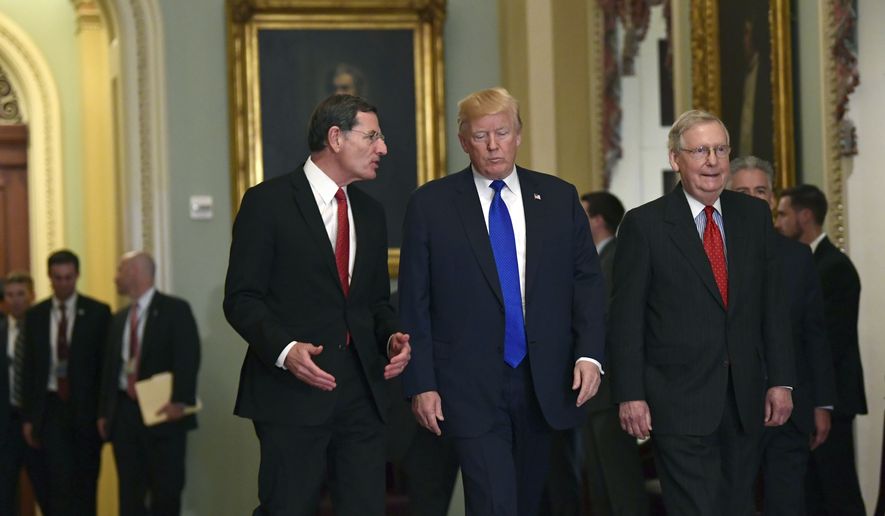President Trump on Tuesday told Senate Republican that he was committed to restoring critical Obamacare payments to insurers as part of a year-end budget deal — but only if Congress approves a tax cut bill that eliminates the individual mandate.
Mr. Trump, who has gone back and forth on a deal to keep the federal payments known as “cost-sharing reductions,” made the pledge at a luncheon with Senate Republicans at the Capitol, said Sen. Lindsey Graham, North Carolina Republican.
“The president is committed to putting Alexander-Murray” on a short-term spending bill, he said.
The legislation by Sen. Lamar Alexander, Tennessee Republican, and Sen Patty Murray, Washington Democrat, would approve the payments in 2018 and 2019. The federal money goes to insurers to reimburse them for covering out-of-pocket health care costs of lower-income Americans.
Democrats had backed the Alexander-Murray bill. But they reversed their position in response to GOP move to repeal the individual, which is the measure at the heart of the Affordable Care Act that requires every American buy health insurance.
“Murray-Alexander was never designed to be in a situation where there was a direct bomb dropped into the ACA,” Senate Minority Leader Charles E. Schumer said.
Congress needs to pass a short-term spending bill by Dec. 8 or else risk a partial government shutdown, and Republicans are looking for ways to win support.
Mr. Graham said the deal would also include legislation by Sen. Susan Collins, Maine Republican, that would provide funding insurance companies receive for high-risk pools of sickly people.
However, for Mr. Trump, approval of the payments hinges on the tax reform bill repealing the individual mandate. The repeal would save taxpayers about $338 billion over 10 years, according to the Congressional Budget Office.
Congress is expected to take up a short-term spending bill or continuing resolution to fund the governing passed a Dec. 8 shutdown deadline.
Bipartisan members of the Senate Health Committee agreed to deal with cost-sharing payments earlier this fall, after Mr. Trump said he could no longer legally dole out the money without congressional approval.
The panel held four hearings on a compromise that would restore the payments and give states more power over their markets, earning kudos from critics who said the public exercise contrasted with the GOP’s partisan and secretive push to repeal and replace Obamacare.
Mr. Trump waffled on the deal struck by Mr. Alexander and Ms. Murray, encouraging the process itself but saying the final product itself didn’t do enough to set the table for a sweeping GOP health overhaul next year.
Democrats said Mr. Trump was negotiating in bad faith and poisoned the waters by cheering efforts to scrap the mandate as part of the tax overhaul.
The Alexander-Murray deal was designed to reel in the premiums increase that insurers baked into their rates to deal with the loss of cost-sharing payments, while throwing Republicans a bone by letting insurers offer cheaper “copper” plans to people of all ages.
They said repealing the mandate would simply inject a new problem in the markets, while chasing away the type of young and healthy people that are needed to balance out sick customers who can no longer be denied under Obamacare. The CBO estimates that insurers will raise their premiums by 10 percent, on average, without the mandate in most years of the coming decade.
The insurer’s top lobbying group, America’s Health Insurance Plans, says any repeal of the mandate should be accompanied by efforts to replace it with an alternative spur.
“The individual mandate plays an important role in ensuring that Americans get covered and stay covered, which helps ensure that coverage is more affordable for everyone who buys their own health plan,” AHIP said Tuesday in a letter to the administration on its 2019 enrollment plans. “If the individual mandate is repealed through legislation, we urge HHS to implement regulatory policies that create strong incentives for consumers to maintain continuous coverage. Without such incentives, there would likely be significant and greater disruptions to the individual market risk pool.”
Ms. Murray said the GOP should just drop its attack on Obamacare altogether.
“The real path forward is to take out the individual mandate provisions in the tax bill that will create such cost effects and chaos that our bill may not even be effective if we were to implement it,” Ms. Murray said.
• Tom Howell Jr. contributed to this report.
• S.A. Miller can be reached at smiller@washingtontimes.com.




Please read our comment policy before commenting.